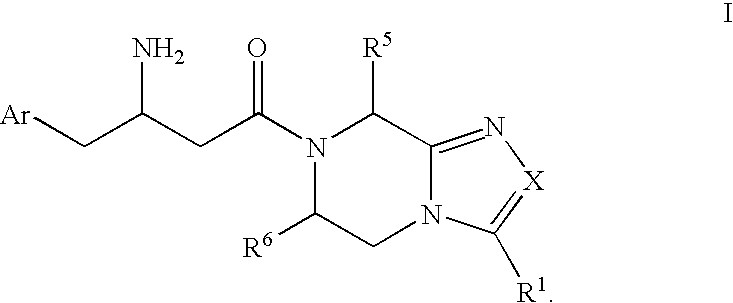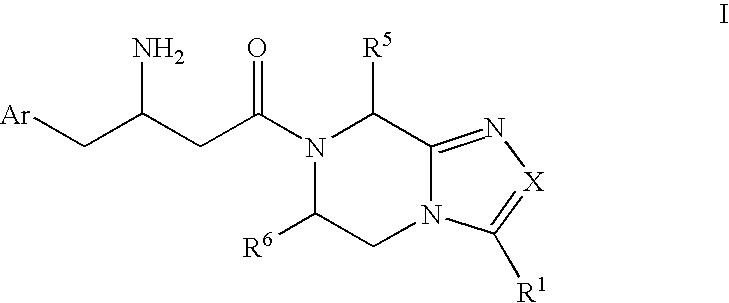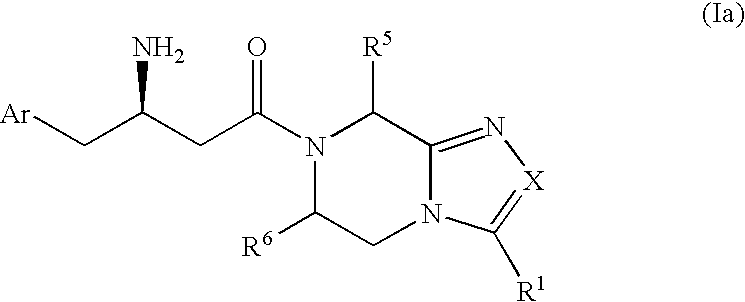Beta-amino heterocyclic dipeptidyl peptidase inhibitors for the treatment or prevention of diabetes
a technology of beta-amino heterocyclic dipeptidyl peptidase, which is applied in the direction of biocide, drug composition, metabolic disorder, etc., can solve the problems of increased and premature morbidity and mortality, increased risk of macrovascular and microvascular complications for patients with diabetes, and increased plasma insulin levels
- Summary
- Abstract
- Description
- Claims
- Application Information
AI Technical Summary
Benefits of technology
Problems solved by technology
Method used
Image
Examples
example 1
[0264]
7-[(3R)-3-Amino-4-(3,4-difluorolphenyl)butanoyl]-3-methyl-6-(phenylmethyl)-5,6,7,8-tetrahydroimidazo[1,2-a ]pyrazine, Dihydrochloride
[0265]Step A. 1-Azido-3-phenyl-2-propanol
[0266]To a mixture of 24.22 g (372.5 mmol) of sodium azide and 19.93 g (372.5 mmol) of ammonium chloride in 150 mL of DMW was added 10.0 g (74.5 mmol) of 2-benzyloxirane. The reaction mixture was stirred at 100° C. for 18 h and then partitioned between water and ethyl acetate. The aqueous phase was extracted with two portions of ethyl acetate. The combined organic phases were washed with brine, dried over magnesium sulfate, and concentrated to give 13.4 g of a viscous oil. Purification by flash chromatography (silica gel, eluting sequentially with 4:1 hexane / ethyl acetate and 1:1 hexane ethyl acetate) gave 10.5 g of the title compound. TLC (Rf=0.41 in 4:1 hexanes / ethyl acetate); 1H NMR (500 MHz, CDCl3) δ 7.37 (t, 2H, J=7.6 Hz), 7.30 (t, 1H, J=6.4 Hz), 7.25 (t, 2H, J=7.3 Hz), 4.01˜4.06 (m, 1H), 3.31˜3.43 (m...
example 2
[0279]
7-[(3R)-3-Amino-4-(3,4-difluorophenyl)butanoyl]-3-methyl-6-(phenylmethyl)-5,6,7,8-tetrahydro-1,2,4-triazolo[4,3a]pyrazine, Dihydrochloride
[0280]Step A. 3-Methyl-N,6-bis(phenylmethyl)-5,6,7,8-tetrahydro-1,2,4-triazolo[4,3-a] pyrazine
[0281]To a solution of 628 mg (2.039 mmol) of 5-ethoxy-1,2-bis(phenylmethyl)-1,2,3,6-tetrahydropyrazine from Example 1, Step C in 15 mL of ethanol was added 181.3 mg (2.447 mmol) of acetic hydrazide. The mixture was stirred at 60° C. for 14 h and then concentrated. The resultant brown viscous oil was dissolved in toluene and heated at reflux for 5 h. The mixture was concentrated. Purification by flash chromatography (silica gel, eluting sequentially with ethyl acetate then 10% methanol / dichloromethane) gave 486 mg of the title compound. MS 319 (M+1).[0282]Step B. 3-Methyl-6-(phenylmethyl)-5,6,7,8-tetrahydro-1,2,4-triazolo[4,3-a]pyrazine
[0283]To a solution of 440 mg (1.384 mmol) of 3-methyl-N,6-bis(phenylmethyl)-5,6,7,8-tetrahydro-1,2,4-triazolo[4,3-...
example 3
[0288]
7-[(3R)-3-Amino-4-(2,4,5-trifluorophenyl)butanoyl]-8-methyl-3-(trifluoromethyl)-5,6,7,8-tetrahydro-1,2,4-triazolo[4,3-a]pyrazine, trifluoroacetate salt
[0289]Step A. 2-Hydrazino-3-methylpyrazine
[0290]To 15 mL of hydrazine hydrate at ambient temperature was added dropwise 5 g (42.9 mmol) of 2-chloro-3-methylpyrazine. The resultant mixture was heated to 120° C. for 45 min then cooled in a refrigerator for 48 h. The yellow precipitate was collected by vacuum filtration and dried under vacuum to give 1.6 g (30%) of the title compound which was used without further purification. 1H NMR (400 MHz, CD3OD) δ 7.94 (d, 1H, J=3.0 Hz), 7.63 (d, 1H, J=3.0 Hz), 2.32 (s, 3H).[0291]Step B. N′-(3-Methylpyrazin-2-yl)-2,2,2-trifluoroacetohydrazide
[0292]To 1.6 g (12.9 mmol) of the product from Step A at 0° C. was added slowly and with vigorous stirring 16 mL of trifluoroacetic anhydride that had been cooled to 0° C. The resultant mixture was stirred at ambient temperature for 1 h, concentrated in v...
PUM
| Property | Measurement | Unit |
|---|---|---|
| volume | aaaaa | aaaaa |
| emission wavelength | aaaaa | aaaaa |
| excitation wavelength | aaaaa | aaaaa |
Abstract
Description
Claims
Application Information
 Login to View More
Login to View More - R&D
- Intellectual Property
- Life Sciences
- Materials
- Tech Scout
- Unparalleled Data Quality
- Higher Quality Content
- 60% Fewer Hallucinations
Browse by: Latest US Patents, China's latest patents, Technical Efficacy Thesaurus, Application Domain, Technology Topic, Popular Technical Reports.
© 2025 PatSnap. All rights reserved.Legal|Privacy policy|Modern Slavery Act Transparency Statement|Sitemap|About US| Contact US: help@patsnap.com



